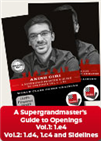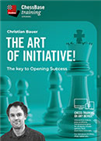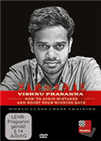Giri and Wei bounce back
Anish Giri recovered well from his defeat against Aravindh Chithambaram in round seven by beating US grandmaster Sam Shankland in round eight. Giri showed why bishops of opposite colours are good for the attacker in the middlegame.
 This video course includes GM Anish Giri's deep insights and IM Sagar Shah's pertinent questions to the super GM. In Vol.1 all the openings after 1.e4 are covered.
This video course includes GM Anish Giri's deep insights and IM Sagar Shah's pertinent questions to the super GM. In Vol.1 all the openings after 1.e4 are covered.
Anish Giri signing an autograph | Photo: Petr Vrabec
Chinese grandmaster Wei Yi started the tournament as the top seed, but only scored half a point in the first three rounds. But then he recovered and scored 4 points from the next 5 games, and now even has a theoretical chance of winning the tournament. Before the final round, he stands one point behind leader Aravindh and half a point behind second-placed Praggnanandhaa. If Wei Yi wins in the final round, Praggnanandhaa draws and Aravindh loses, the three would be tied for first place and would have to decide the tournament winner in a play-off. However, such a scenario is not very likely.
Wei had an advantage in his encounter against Thai Dai Van Nguyen for almost the entire game, but only won after Nguyen erred in a balanced ending.
 Unleash your chess potential with this dynamic course focused on mastering the initiative.
Unleash your chess potential with this dynamic course focused on mastering the initiative.
Wei Yi | Photo: Petr Vrabec
The three remaining games of the round ended in draws. Aravindh played it safe against David Navara, Praggnanandhaa played a tactically and strategically demanding game against Le Quang Liem, which ended in a draw by repetition, and Vincent Keymer put Ediz Gürel under constant pressure, but was unable to turn this pressure into anything tangible.
Round 8 results
Standings
All games
Challengers: Yakubboev beats Stalmach, leads
In the Challengers, Uzbek grandmaster Nodirbek Yakubboev has the best chance of winning the tournament. He won convincingly with black against Richard Stalmach in the eighth round and secured the sole lead in the table, since Jonas Buhl Bjerre could not go beyond a draw against Vaclav Finek.
 Doesn’t every chess game get decided by mistakes? Absolutely. But most players never truly comprehend that they are making the same kind of mistakes over and over again.
Doesn’t every chess game get decided by mistakes? Absolutely. But most players never truly comprehend that they are making the same kind of mistakes over and over again.Yakubboev therefore goes into the final round with a half-point lead and will win the tournament and qualify for next year's Masters if he beats Finek.

Nodirbek Yakubboev during round seven | Photo: Petr Vrabec
Round 8 results
Standings
All games
Links
























